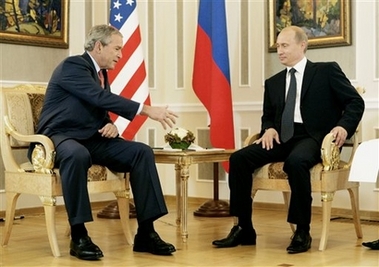U.S. President George W. Bush and Russia's Vladimir Putin met before a G8
summit on Saturday, but their meeting was overshadowed by failure to agree on a
major bilateral trade deal sought by Russia.

U.S. President George
W. Bush, left, extends his hands to Russian President Vladimir Putin,
right, at the start of their bilateral meeting at the G8 Summit in St.
Petersburg, Russia, Saturday, July 15, 2006.
[AP] |
The Bush-Putin talks, following a more casual barbecue get-together between
the two men on Friday night, will set the tone for the weekend summit at which
Middle East violence and the standoff over Iran's nuclear ambitions will also
loom large.
Putin expressed early hope of success at the Group of Eight summit of
industrialised countries. "I hope the meeting will give a good boost to the G8
summit," Putin told Bush as the two leaders went into talks.
But just after the meeting began, a U.S. trade spokesman said Russian and
U.S. trade negotiators had failed in marathon talks to strike a bilateral deal
to open the way for Russian entry to the World Trade Organisation.
"A final agreement has not been reached, but significant progress was made,"
Sean Spicer, spokesman for U.S. Trade Representative Susan Schwab, told Reuters.
The annual meeting of the Group of Eight industrialised nations has in the
past attracted anti-globalisation protests, but tight restrictions and heavy
policing have kept all but a few hundred activists away from Russia's second
city.
Despite the setback on a WTO deal, Bush and Putin were expected to announce
an agreement to begin negotiations that could ultimately clear the way for
Russia to import and store thousands of tonnes of spent nuclear fuel from
U.S.-supplied reactors around the world, aides said.
Energy security tops the summit's formal agenda and - once Bush and Putin are
joined by leaders from France, Germany, Italy, Britain, Canada and Japan later
in the day - the eight could seek to send a signal to calm volatile oil markets.
Bush signalled his intent to put democracy centre stage when he arrived on
Friday, telling beleaguered Russian rights activists he would relay their
concerns to Putin. But he also said he would raise those concerns privately.
Kremlin spokesman Dmitry Peskov told reporters that Friday night's meal had
taken place in an "exceptionally warm and frank atmosphere". "It really was a
very frank discussion," he said.
Putin's critics accuse him of rolling back the democratic reforms of the
1990s.
The former KGB spy responds that the country he leads, a top oil and gas
exporter with a booming economy, is a far cry from the chaotic nation that
defaulted on its debts in the decade following the collapse of the Soviet Union.
The Russian leader's main hope for the summit is to display his nation's
new-found self-confidence. The setting in a lavishly restored 18th century
palace that looks out onto the Gulf of Finland underscores that revival.
Far from the heavily guarded summit venue, Saturday will also feature some
small demonstrations.
The opposition Communist Party said it obtained permission to hold a rally in
a central square to protest against joining the WTO and what it calls Moscow
serving Western interests.
And a group of about 300 anti-globalisation protesters who have been given a
distant sports stadium to rally inside planned to stage a "break-out" from the
arena later in the day, although organisers described it as a largely symbolic
act.